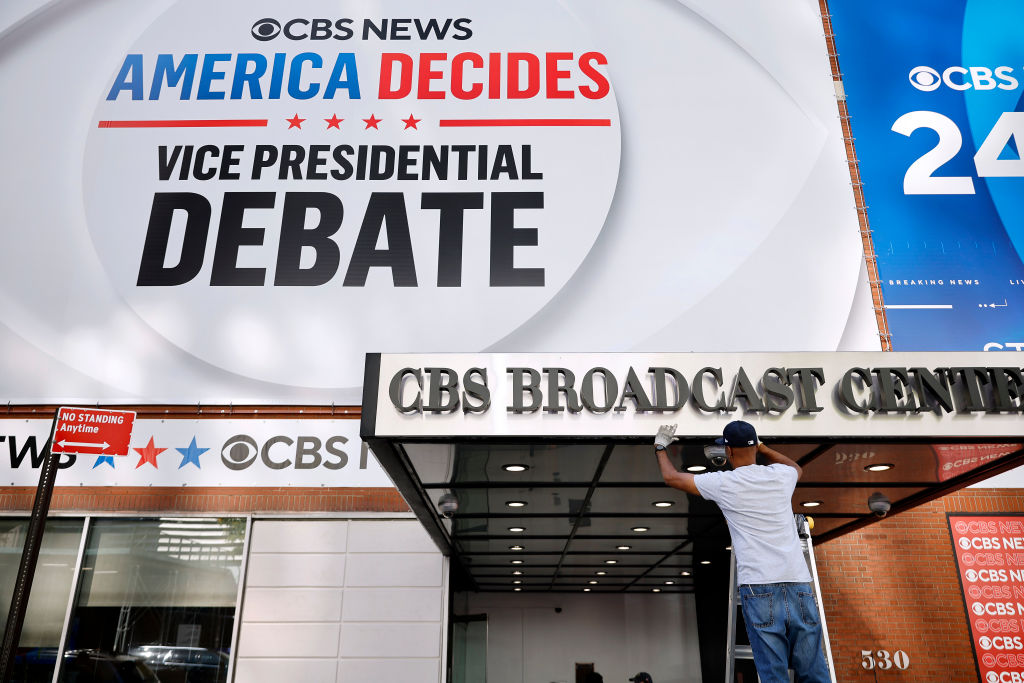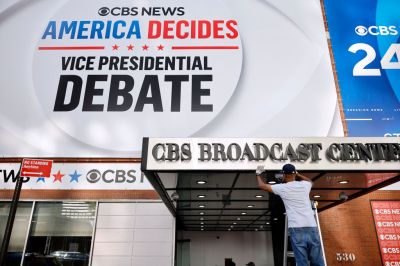Happy Tuesday! Election Day is 35 days away. Happy 100th birthday to former President Jimmy Carter, the longest-living former chief executive in American history.
Up to Speed
- Georgia Gov. Brian Kemp confirmed Monday that President Joe Biden telephoned him Sunday and the two spoke about what his state needs to recover from Hurricane Helene. “I missed him and called him right back and he just said: ‘Hey, what do you need?’ And I told him, we got what we need,” Kemp told reporters. (A Republican official in Georgia confirms the governor’s account.) Kemp’s comments contradict claims made by Donald Trump the same day. The former president and GOP presidential nominee said while touring disaster-relief efforts in Valdosta, Georgia, that Biden is being unresponsive to governors in the hurricane-ravaged Southeast and ignoring some areas altogether because the Americans affected are Republican voters. “The governor is doing a good job but he’s having a hard time getting the president on the phone. I guess they’re not being responsive,” argued Trump, whose assertions that North Carolina is being ignored were also disproven, in this case by the fact that the head of the Federal Emergency Management Agency is temporarily based in the Tar Heel State and has been meeting with Gov. Roy Cooper, a Democrat.
- Trump also accused Vice President Kamala Harris of posting a “FAKE and STAGED photo” on X purporting to show her working on the federal government’s response to the hurricane. “They sacrificed Americans to an Open Border, and now, they have left Americans to drown in North Carolina, Georgia, Tennessee, Alabama, and elsewhere in the South,” he said in a Truth Social post. “Under this Administration, Americans always come last, because we have ‘leaders’ who have no idea how to lead!” Harris held telephone briefings with FEMA officials and said Monday prior to a briefing at the agency’s headquarters in Washington, D.C., that she had spoken directly with Kemp, Cooper, and various elected officials in the impacted areas.
- Harris said during a podcast interview released Tuesday that she favors legalizing marijuana. “I just think we have come to a point where we have to understand that we need to legalize it and stop criminalizing this behavior,” she told former NBA players Matt Barnes and Stephen Jackson on their All the Smoke podcast. “Actually, this is not a new position for me. I have felt for a long time we need to legalize it. So that’s where I am on that.” Though she spoke out against legislation that would have legalized weed in California in 2010 while she was San Francisco district attorney, she favored legalization during her campaign for the Democratic presidential nomination in 2020. Her position goes farther than that of President Joe Biden, who has moved to reclassify marijuana as a less dangerous drug and pardon people convicted of simple possession of it, but has not supported its legalization.
- A new poll of Pennsylvania likely voters sponsored by AARP and conducted by a pair of polling firms—one Republican and one Democratic—finds Harris with a narrow lead in the Keystone State, 49 percent to Trump’s 47 percent. As Politico first reported, the poll is an improvement for the Democratic nominee in Pennsylvania from AARP’s survey in April, when Biden was down by 5 points to Trump. Harris is overperforming where Biden was against Trump among nearly every demographic group—except seniors: “Harris is losing voters aged 65 and older by 7 points, compared with 1 point for Biden.” The Real Clear Politics average of polls (which has not as of publication incorporated the AARP poll) finds Harris and Trump effectively tied in Pennsylvania.
The future we dreamed of is waiting. Let’s go!

Personalities May Define the Walz-Vance Debate

Tonight, Democratic nominee Tim Walz and Republican nominee J.D. Vance will meet in the vice presidential debate in New York, hosted by CBS News and moderated by anchors Margaret Brennan and Norah O’Donnell. It’s the first and only time both men will face each other directly on a stage, and it could also be the last televised debate between any members of the major-party tickets before November 5. (And for those interested, Vance’s running mate is promising to do “personal PLAY BY PLAY” coverage of the debate in real-time on his Truth Social page.)
Before last month’s debate between Kamala Harris and Donald Trump, we asked our colleagues here at The Dispatch for their thoughts on how that matchup would matter—especially in light of how the entire election changed as a result of the June debate between Trump and President Joe Biden. This time, we posed the same question for another Dispatch Politics pre-debate symposium: What would make this debate consequential?
Jonah Goldberg: The vice presidential debate is tonight. Who among us can contain their excitement?
Well, plenty of people, I suspect. I’m certainly not pacing the floor, desperate for the seconds to tick faster. I’d guess that the audience will be a bit larger than for most VP debates but certainly smaller than the last presidential debate. The reasons for this are pretty obvious. It’s a close race and people are on edge. Both candidates are relatively unknown. And given how much of what we know—or are supposed to know—about Kamala Harris is being written and rewritten on the fly, people eager to flesh out that picture might be extra motivated to check out her running mate. That the Harris-Walz campaign has kept Walz unusually under wraps might goose curiosity a bit further. It also means the stakes for Walz are higher than for Vance. Short of admitting to a romantic relationship with his running mate, there’s nothing Vance can say that will change impressions of Donald Trump. But Walz could, at the margins, influence how people see Harris.
To answer the question before the house: If neither of them screws up massively, the debate will be inconsequential. If one of them does screw up massively, it might matter a little, depending on the nature of the mistake.
Given the role of “vibes” in this election (kachink—I just put a quarter in the “Don’t Say Vibes” jar), I think the most memorable or interesting thing about the debate will be their interpersonal dynamic. Vance has carved out the role of smart-ass, very online bro. Walz is committed to the unthreatening sitcom dad and wisdom-dispensing high school coach. In the real world and various fictional ones, the dynamics between these two archetypes often butt heads. It will be interesting to see to what degree they play to type in the gray in-between of those realms that is a vice presidential debate.
David M. Drucker: The debate between the Democratic and Republican nominees for vice president tends not to matter. Unless … one of them presents as unqualified.
When J.D. Vance meets Tim Walz on stage this evening for the only vice presidential debate, both are likely to spend the majority of their 90 minutes in front of the camera promoting (and defending) their respective running mates. For Vance, that’s Republican nominee and former President Donald Trump. For Walz, that’s Democratic nominee and Vice President Kamala Harris. And so ultimately, just one aspect of the debate matters: Will Vance and Walz pass the commander-in-chief test?
To be sure, Vance, 40, and Walz, 60, will battle over elements of their personal and political backgrounds. Vance could criticize Walz for decisions related to service in the National Guard, six terms as a congressman, and nearly six years as governor—even time he spent as a high school teacher. Walz could do the same, pressing Vance on elements of his work as a venture capitalist, his evolution from Trump critic to Trump acolyte, and a political career that spans barely more than three years.
But unlike a presidential debate, winning those exchanges—on points or in the court of public opinion—is secondary. What matters is presenting as qualified. In other words, Vance and Walz need to leave voters with the impression they are sufficiently knowledgeable, and possess the personal fortitude, to serve as president if duty calls. Will they?
John McCormack: There could very well be a gaffe or a comment that has nothing to do with foreign policy that defines tonight’s debate, but one big question is whether both J.D. Vance and Tim Walz pass the commander-in-chief test.
Joe Biden dropped his presidential campaign at the age of 81, and with Donald Trump turning 82 years old before the end of the next presidential term, a Vice President Vance could very well become President Vance before January 2029. Can the 40-year-old first-term Ohio senator—an anti-interventionist strongly opposed to U.S. military aid to Ukraine—convince voters that he has what it takes to maintain alliances and lead America in a dangerous world?
With 59-year-old Kamala Harris at the top of the Democratic ticket, there’s less of a reason to think a Vice President Walz would become President Walz in the next four years. But Harris herself had little foreign policy experience before becoming vice president and tended to focus on domestic policy issues, such as abortion, while serving as vice president. One selling point of Walz as Harris’ running-mate seemed to be his record in the National Guard—until it was revealed Walz had inflated his record. Can the staunchly progressive Minnesota governor and former high school history teacher reassure voters that he isn’t soft on China and has what it takes to be commander-in-chief?
Steve Hayes: If the question at hand is “What would make this debate consequential?” in the context of next month’s election, the answer is rather straightforward: Meh, not much.
It’s hard to imagine many voters who will decide their votes based on what they see tonight. That’s in part because vice presidents historically don’t influence many votes and in part because these two men, in particular, are perceived as extensions of the candidates at the top of the ticket.
Walz is a progressive more in tune ideologically with 2019 Kamala Harris than 2024 Kamala Harris. The tension there could produce some interesting moments, as newly centrist Harris, to the extent we can divine what her policies will be, appears to be a few clicks to the right of Walz. The other question on Walz: Can he pass the commander-in-chief test? The campaign rolled him out as a coach and a dad and a prototypical regular guy. That helps on relatability but makes it harder to cast him simultaneously as a statesman with the knowledge and background to weigh in on consequential issues of global importance. (Walz may try to avoid one area where he can speak with some authority on foreign policy, China, because he’s guilty of at least exaggerating his experience there and perhaps lying about it.)
The question for Vance is whether he can make himself more likable than the guy who seems to have been channeling Tucker Carlson and Alex Jones as he’s campaigned. To his credit, he’s been far more willing to sit for interviews and engage on policy than Walz, Harris, or Trump. Unfortunately, he’s too often come off as angry and out-of-touch. His willingness to say things that aren’t true—and then defend them in perpetuity—could contribute to several days of negative post-debate coverage even if he manages to present well on stage.
A secondary, longer-term question for Vance is whether he can position himself as a leader of the GOP in a post-Trump world, whenever that happens. There’s little question that he’ll enter that next political moment with MAGA street cred, but can he expand his appeal beyond ultra-MAGA?
Kevin D. Williamson: Short of an unlikely chain of events leading to an eight-day bipartisan psilocybin bender and matching tattoos for the nominees, it is difficult to think of a way for this debate to be consequential.
It may be interesting to see how MAGA-fied the party really has become—the Democratic Party, I mean. History has handed Tim Walz a loaded rhetorical gun if he wants to use it: J.D. Vance is obviously sore—and cranky—about the “weird dudes” stuff, and he has added to the ammo stockpile with his undeniably weird fixation on imaginary cat-eating Haitians in Springfield, Ohio. Walz likes his dumb couch jokes, you’ve got Barack Obama out there making d–k jokes at Donald Trump’s expense, and Vance’s turn toward pathological dishonesty gives Walz every excuse to just write him off as an obviously pandering liar on all the policy questions, leaving the field clear for mockery and derision. The Republicans in the Trump years have been a party with very little more than mockery and derision to offer, and the Democrats may decide that it makes sense to follow that lead. I wouldn’t expect a lot of talk about dynamic scoring of big-ticket fiscal proposals or anything like that.
Eyes on the Trail
- Donald Trump will deliver remarks on inflation during an afternoon event at a manufacturing facility in Waunakee, Wisconsin. In the evening, the former president will headline a similar campaign event in Milwaukee, at an institution focused on childhood education.
- Sen. J.D. Vance Ohio and Minnesota Gov. Tim Walz will face off this evening during a vice presidential debate hosted by CBS News and broadcast from its headquarters in New York City. The broadcast begins at 9 p.m. ET.
- Doug Emhoff also will be in Milwaukee today to headline a Harris campaign event focused on the economy. Time and location for the second gentleman’s visit to Wisconsin were not disclosed by the vice president’s campaign. Emhoff will be joined by Commerce Secretary Gina Raimondo.
Best Read on the Trail
“They’re about the same age but it’s hard to think of a Republican who, stylistically, differs more from Trump than Richard Michael DeWine. While Trump, and for that matter Vance, is a media creation, DeWine has been in public office since he was elected Greene County prosecutor in 1976.
…
“Yet here’s what you need to know about DeWine and Haiti: his first experience with the country’s citizens wasn’t with Springfield. Mike and Fran DeWine have been quietly helping underwrite a Catholic school in…one of the most destitute parts of Port-au-Prince for over two decades. It’s called the Becky DeWine School and it was named after the DeWines’ late daughter, who died in a 1993 car accident when she was 22.”
—From ‘Just Not Right’: A GOP Governor Confronts Trump’s Lies by Jonathan Martin in Politico
Notable and Quotable
“The head guy called me up. I said, ‘You have no right to write a thing like that. You’re not speaking for me’ ... I said, ‘You really — what you did is terrible.’”
—Former President Donald Trump, to Washington Post columnist Marc Thiessen, on Heritage Foundation President Kevin Roberts and the organization’s Project 2025 Mandate for Leadership proposal, September 30, 2024












Please note that we at The Dispatch hold ourselves, our work, and our commenters to a higher standard than other places on the internet. We welcome comments that foster genuine debate or discussion—including comments critical of us or our work—but responses that include ad hominem attacks on fellow Dispatch members or are intended to stoke fear and anger may be moderated.
With your membership, you only have the ability to comment on The Morning Dispatch articles. Consider upgrading to join the conversation everywhere.